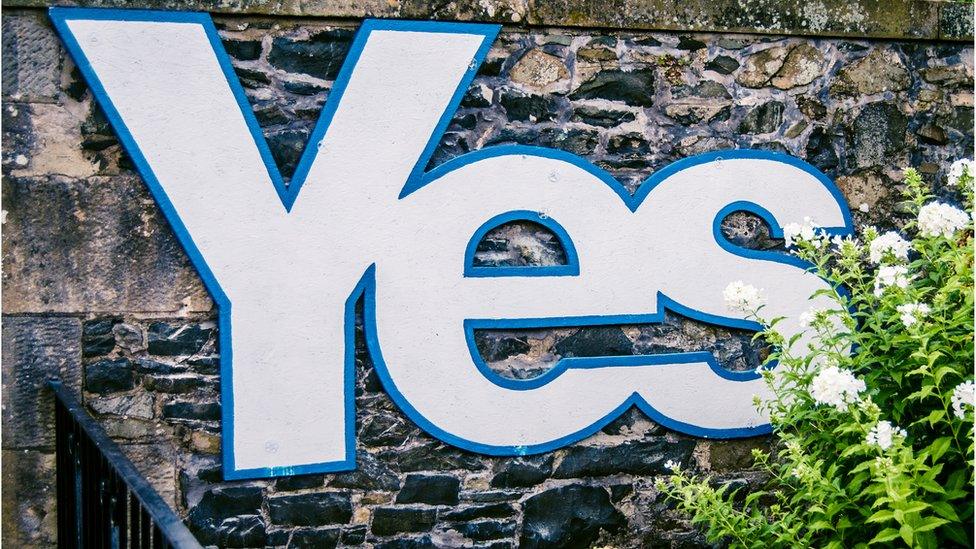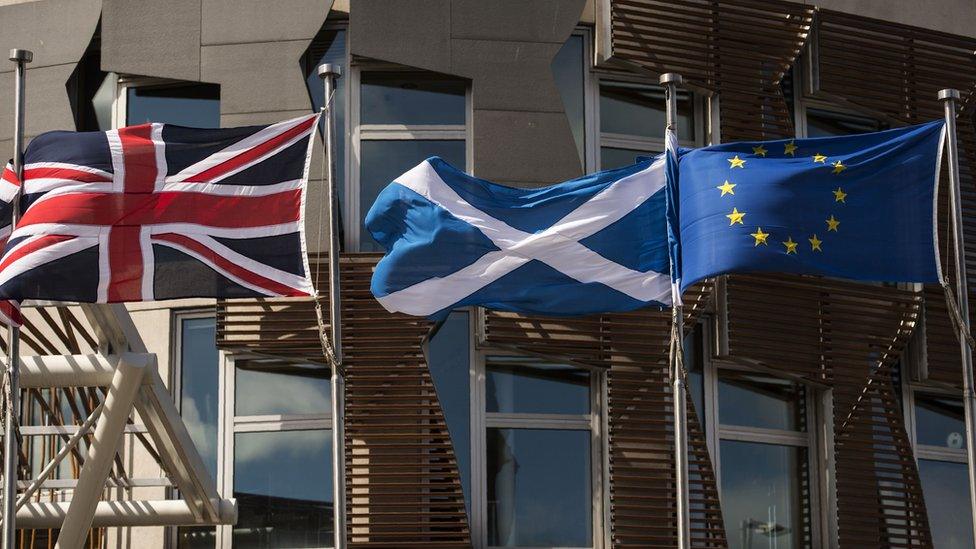Indyref2 - Has the tide turned since the Brexit vote?
- Published

The Leave side's victory in last Thursday's referendum on Britain's membership of the European Union has put the question of Scottish independence back on the political agenda.
The First Minister, Nicola Sturgeon, had previously indicated that if Scotland voted to Remain (as it did by 62% to 38%), while the UK as a whole opted for Leave, such an outcome would be regarded as a "material change of circumstance" that could justify calling a second referendum on independence.
So when that proved to be what happened Ms Sturgeon was, unsurprisingly, quick to indicate she was now pursuing the possibility of consulting voters about Scotland's constitutional status once again.
There is, though, many a hurdle that will have to be surmounted before a second independence referendum is held.
These include whether the Scottish Parliament has or can acquire the legal authority to hold such a referendum, and whether the EU itself would be willing to make it relatively easy for an independent Scotland to become a member.
Public opinion
However, the first and most crucial hurdle is how voters in Scotland react.
Will those who voted No to independence in September 2014 agree with the SNP that it is "undemocratic" for Scotland to be forced out of the EU as a result of votes cast in England and Wales?
Or will they take the view that, as an integral part of the UK, the country should accept the UK-wide majority verdict?
Three polls published on Sunday and Monday give us an initial answer to these questions. All three report that there is now a majority in Scotland in favour of independence.

Sources close to Nicola Sturgeon have previously indicated she would like to see 60% support for independence before calling another referendum
However, the majority may only be a narrow one, suggesting that Nicola Sturgeon could be taking quite a gamble if she does opt to hold a second ballot soon.
The most dramatic poll findings come from ScotPulse in a poll conducted for The Sunday Post newspaper. It reported that 59% are now in favour of independence, while 32% said they would vote against.
If the Don't Knows (9% of the sample) are left to one side, that implies that Scotland would now vote decisively for independence by 65% to 35%.
However, the polling firm in question, ScotPulse, has no previous record of conducting political polls in Scotland. It is also not a member of the British Polling Council whose members are under an obligation to publish details of their methods and statistics.
We thus might want to suspend our judgement on how much reliance we should place on its findings.
Modest majority
Still, the online polls of two other companies that do have a track record of polling in Scotland confirm ScotPulse's message that there is now a majority in favour of independence, However, crucially, they suggest it is a much more modest majority.
Panelbase (for The Sunday Times) reckon that 52% would now vote Yes, 48% No. Survation (for the Daily Record) put the figures at 54% and 46% respectively.
In truth, both of these polls should be regarded with a degree of caution too. Panelbase only had sufficient time to interview 626 people, well below the figure of a thousand that is normally regarded as the minimal acceptable.
And while Survation's poll did interview 1,000 people, a close look at their figures reveals that a majority of their respondents said that they voted Yes in the September 2014 referendum.
That may be an indication that their sample is not wholly representative of Scottish opinion.

A number of polls indicate the Brexit vote has increased support for Scottish independence
However, the findings of both these polls are consistent with the evidence of five other polls that were conducted before the EU referendum that asked people both how they would vote at present in a second independence referendum, and how they would vote if the UK as a whole voted to leave the EU.
On average, these found that support for independence in response to the second question was between four and five points higher than when people answered the first.
Prior to the EU referendum, the polls were on average reporting that 47% were currently in favour of Yes (and 53% to No).
Tough decisions
So the findings of the five polls that asked people what they would do if the UK were to leave implied that such an outcome would result in a small majority in favour of independence in Scotland. For all their possible limitations, this is precisely what both Panelbase and Survation's polls have now found.
Still, we will have to wait a while before we get a firm idea of just how much impact the UK's decision to leave the EU has on attitudes towards independence in Scotland. Much may well depend on what the political and economic consequences of that decision prove to be.
But so far the evidence is consistent with the claim that there is now a narrow majority in favour of independence in Scotland.
However, from Nicola Sturgeon's point of view the trouble with a small majority is that she cannot necessarily be confident that it will withstand the rigours of a referendum campaign - David Cameron can testify to that.
Hitherto, the SNP has let be known that, for precisely that reason, they would like to see at least 60% support for independence in the polls before embarking on a second independence referendum.
So far, however, the public reaction in Scotland to the vote on Thursday may not have been big enough to take the level of support for independence to that target.
If that remains the case, Ms Sturgeon may well face a tough decision as to whether to gamble on a second independence referendum or not.
John Curtice is chief commentator at whatscotlandthinks.org, external.